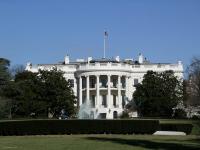The Bush Whitehouse continues to stonewall around the critically important Deep Space Climate Observatory (DSCOVR).
I recently received a long-overdue response to a freedom of information request about the mission. After waiting six months, thirteen documents were located – and all were withheld from release.
So why did the Whitehouse even have “predecisional draft documents that include…deliberative comments” about the DSCOVR mission? Does this indicate the Bush administration had a direct hand in killing this project?
NASA strangely mothballed this unique spacecraft after spending over $100 million building it. It remains fully completed and in a box at the Goddard Space Center in Maryland. Senior scientists believe this spacecraft could almost immediately resolve any remaining honest debate about the seriousness or causes of climate change.
An investigation by DeSmog Blog earlier this year showed that this mission could be launched and operated at a cost to NASA of only $55 million – less than 0.3% of NASA’s annual budget.
I have been digging for answers on this strange case since 2006. Last October I filed freedom of information request to the Whitehouse Office of Science and Technology Policy (OSTP), Executive Office of the President. This seems to be the only office at the Whitehouse that is still subject to Freedom of information legislation.
As usual, nothing happened for months and I emailed them several times to find out what was going on. Government bodies have a duty to respond to requests within 20 working days. By now it was close to 120.
At this point I had not even received an acknowledgement letter. It finally arrived last month. And guess what? They withheld all the documents touching on or relating to the DSCOVR mission.
Specifically, Whitehouse Deputy General Counsel Rachael Leonard stated that their office had “found 13 responsive documents, however, eight of these documents are being withheld pursuant to FOIA exemptions (b)(5) and (b)(2). Specifically, these documents are predecisional draft documents that include OSTP’s deliberative comments, and as such are exempt from disclosure under FOIA exemption (b)(5).”
The other five documents were withheld by the OSTP because they “have been referred to other agencies for their review”.
In other words after six months of delay, the Whitehouse has refused to release any documents relating to DSCOVR.
All of which begs the question, why does the Whitehouse even have any documents relating to the DSCOVR mission? Especially,“predecisional draft documents that include OSTP’s deliberative comments”? What possible comments or input could the Whitehouse have on a specific NASA project like DCSOVR?
Lets have a closer look at the Office of Science and Technology Policy. It is headed by Dr. John Marburger, who has in the past seemed an apologist for the Bush Administration, in response to charges from the scientific community that the Whitehouse manipulates climate science to downplay the dangers of climate change.
Many in the science community are critical of Marbuger for his seeming complicity in scientific censorship.
A report released by the Union of Concerned Scientists stated that “the scope and scale of the manipulation, suppression and misrepresentation of science by the Bush administration is unprecedented.”
A second report in 2007 surveyed 1600 climate scientists in the US and found that “nearly half of all respondents (46 percent) perceived or personally experienced pressure to eliminate the words “climate change,” “global warming,” or other similar terms from a variety of communications.”
Marburger himself seems to be taking his marching orders from George Bush to realign NASA’s space programs to focus on missions that will benefit America’s economy rather than the advancement of science, such as climate change.
In a keynote address he gave at NASA headquarters in 2006, he stated:
“As I see it, questions about the vision boil down to whether we want to incorporate the Solar System in our economic sphere, or not. Our national policy, declared by President Bush and endorsed by Congress last December in the NASA authorization act, affirms that, ‘The fundamental goal of this vision is to advance U.S. scientific, security, and economic interests through a robust space exploration program.’ So at least for now the question has been decided in the affirmative.”
The DSCOVR mission hardly fits that bill. It is primarily designed to accurately measure the energy budget of our warming planet – for the first time ever.
In contrast, the Bush administration seems much more interested in having NASA mine the moon – and actively suppressing rather than advancing climate science. One thing is certain – this administration is not shy about imposing its will on the scientific community.
Would the thirteen documents withheld by the Whitehouse prove that the Bush administration killed the DSCOVR mission? We may never know, but we will keep digging.
Subscribe to our newsletter
Stay up to date with DeSmog news and alerts







